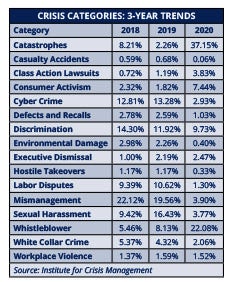
Each year, the Institute for Crisis Management (ICM) tracks crisis-related news stories, classifying them as “sudden” or “smoldering” and putting them into one of 16 categories for its annual report.
One of ICM’s goals with the report is to provide businesses with insight about crisis and media’s crisis coverage. Armed with this knowledge, executives and communicators can prepare better.
ICM knew its latest report, which tracks 2020’s crisis stories, would be an anomaly. Pandemic stories, which ICM placed in the Catastrophes category, skyrocketed that space to 37.15 percent, vs just 2.26 percent in 2019. In all, 1.7 million crisis stories were tracked. News items about the pandemic itself accounted for 615,000 of them.
COVID-related crisis stories were placed in several categories, including Class Action Lawsuits, Consumer Activism, Discrimination and Whistleblower.
COVID influenced other categories, too. For example, with so many people working from home, the Sexual Harassment category dropped sharply from 2019.
And since the pandemic took up so much bandwidth, reporters wrote fewer stories about other issues.
 A fair question is whether or not it’s useful to track crisis stories in a year when a once-in-a-lifetime crisis event (we hope) dominated. Yes, it is.
A fair question is whether or not it’s useful to track crisis stories in a year when a once-in-a-lifetime crisis event (we hope) dominated. Yes, it is.
Why? Organizations learned about the importance of crisis planning the hard way, scrambling to address an unlikely but devastating event.
We also discovered that when some organizations’ poor response to COVID resulted in negative media attention, it raised questions about management practices across the board.
Smoldering crises—internal issues that don’t become a crisis until they go public—typically accounted for most news items. In 2020, for the first time, sudden crisis items outnumbered smoldering crisis stories.
In so-called normal years, Mismanagement, defined as professional malpractice, misappropriation of resources, misconduct, negligence, collusion, and unethical practices that lead to adverse impact on organizations, was the leading category in the report. It garnered nearly 20 percent of those ICM tracked in 2019.
In 2020, pandemic stories demolished the category, and Mismanagement dropped to slightly less than 4 percent of stories tracked.
In the Whistleblowers category, numerous watchdog agencies reported COVID-related problems, as complaints alleged employers’ failure to protect employees from the virus.
Activism news stories rose in 2020. Allegations of pandemic-related price gouging plagued retailers. Amazon was accused of influencing price-setting of third-party sellers on the platform.
COVID will continue to impact the issues gaining journalists’ attention throughout 2021. Companies must prepare for both the kinds of crises that are likely to happen, and those that, while unlikely, can have a significant impact on business. As we like to say, “prepare and prevent, or you will have to repair and repent.”
- Deb Hileman
Deb Hileman, SCMP, is president and CEO, Institute for Crisis Management
